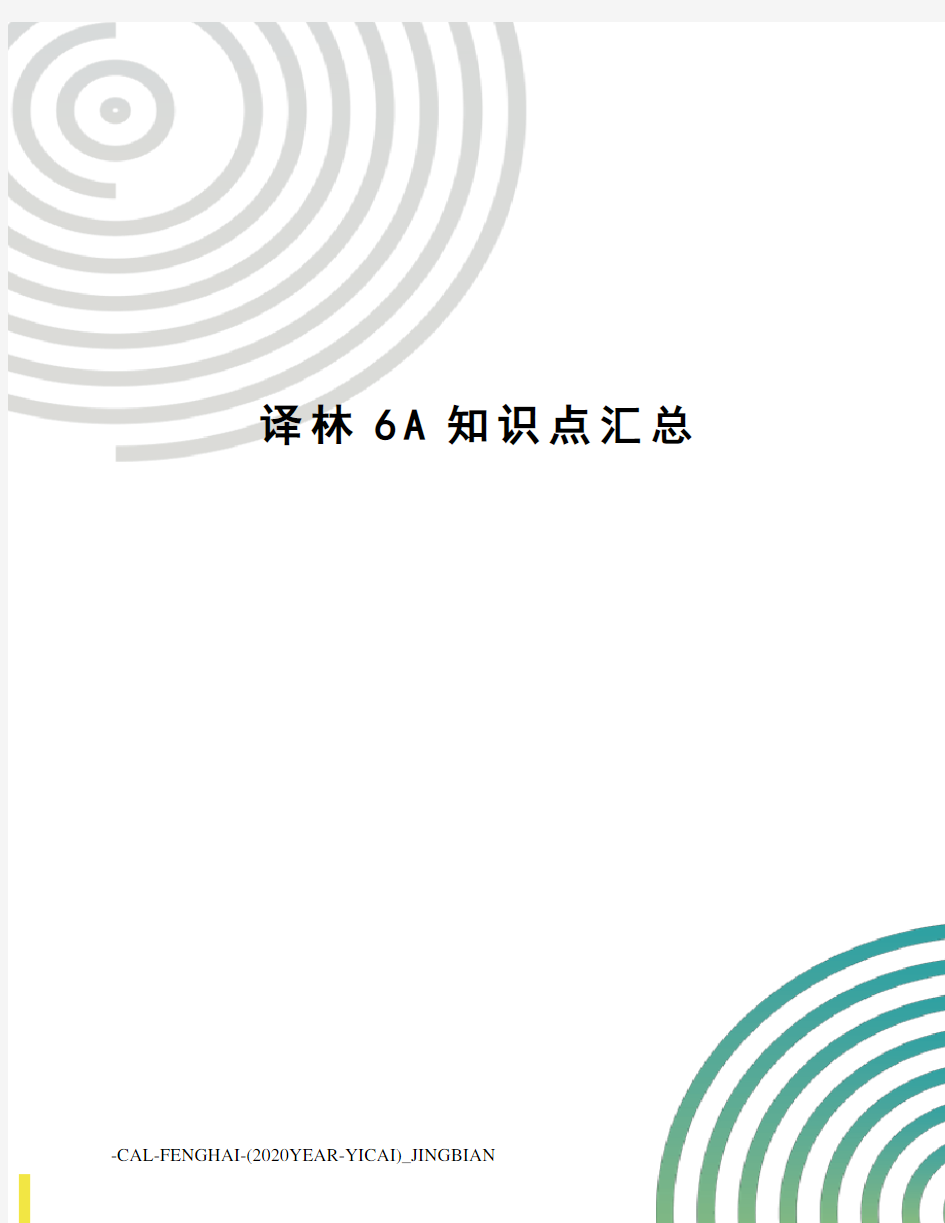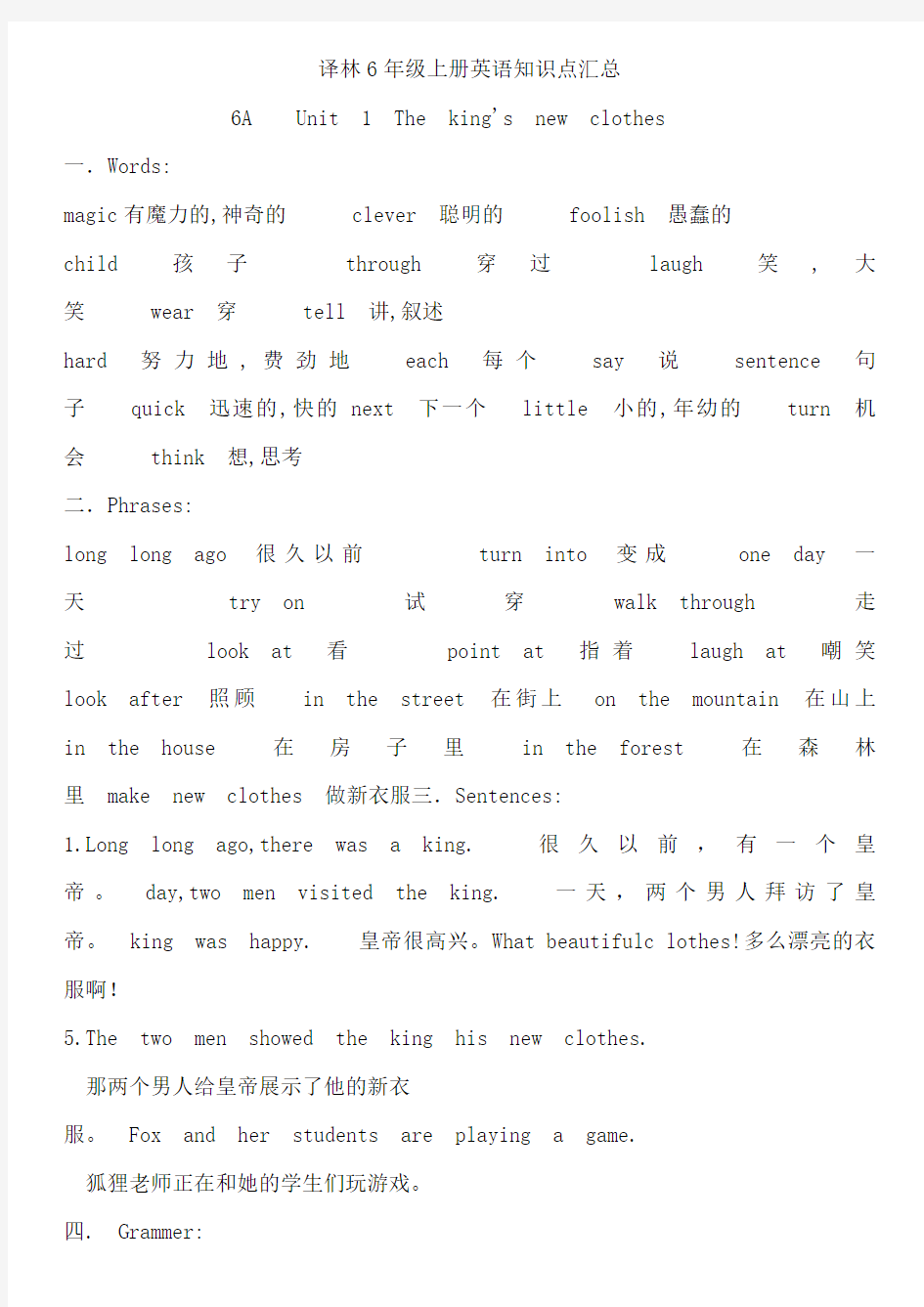

译林6A知识点汇总-CAL-FENGHAI-(2020YEAR-YICAI)_JINGBIAN
译林6年级上册英语知识点汇总
6A Unit 1 The king's new clothes
一.Words:
magic有魔力的,神奇的clever 聪明的foolish 愚蠢的
child 孩子through 穿过laugh 笑,大笑wear 穿tell 讲,叙述
hard 努力地,费劲地each 每个say 说sentence 句子quick 迅速的,快的next 下一个 little 小的,年幼的turn 机会think 想,思考
二.Phrases:
long long ago 很久以前turn into 变成one day 一天try on 试穿walk through 走过look at 看point at 指着laugh at 嘲笑look after 照顾in the street 在街上on the mountain 在山上in the house 在房子里in the forest 在森林里make new clothes 做新衣服三.Sentences:
1.Long long ago,there was a king. 很久以前,有一个皇帝。day,two men visited the king. 一天,两个男人拜访了皇帝。king was happy. 皇帝很高兴。What beautifulc lothes!多么漂亮的衣服啊!
5.The two men showed the king his new clothes.
那两个男人给皇帝展示了他的新衣
服。Fox and her students are playing a game.
狐狸老师正在和她的学生们玩游戏。
四. Grammer:
1.概念
在过去某个时间里发生的动作或存在的状态:过去习惯性或经常性的动作、行为。2.时间状语
ago,yesterday,the day before yesterday,last week(year,night,month…),i n 1989,just now,long long ago,once upon a time.
3.肯定句
主语+行为动词(过去式)+其他。
例如:I was born in 1998. 我在1998年出生。
My grandfather died last year.我(外)祖父去年去世了。
4.否定句:
主语+didn’t+行为动词(原形)+其他。
例如:He didn’t do his homework yesterday. 他昨天没有做他的家庭作业。
I didn’t know you were here. 我不知道你在这儿。
6.一般疑问句
Did+主语+行为动词(原形)+其他肯定回答:Yes,主语+did. 否定回答:No,主语+didn’t.
例如:---Did you go to the zoo last week 你上周去动物园了吗---Yes,I did. 是的,我去了。
7.动词过去式的规则变化和一些不规则变化构成方法:
1) 一般在动词词尾直接加-ed加help-helped,clean-cleaned, visit-
visited, show-showed, walk-walked, look-looked, shout-shouted, point-pointed
2) 以不发音的字母e结尾的动词,在词尾直接加-d.
live-lived,move-moved, like-liked,
3)以辅音字母加y结尾的动词,变y为i,再加-ed. study-studied,cry-cried
4)以一个元音字母加一个辅音字母结尾的重读闭音节动词,先双写末尾的辅音字母,再加-ed. plan-planned,stop-stopped 不规则变化(特殊记忆):
am/is-was, are-were, go-went, meet-met, see-saw, do-did, get-got, read-read
6A Unit 2 What a day!
一.单词:
sunny晴朗的 show展览,展示 interesting 有趣的,有意思的 weather 天气become 变成,成为 windy 有风的 honey 蜂蜜 cloudy多云的 high在高处
drink饮料 ant蚂蚁 bee蜜蜂 cloud云 rain下雨 rainy多雨的meet 遇见 lose 丢失 know知道
二.短语:
in the moring/ afternoon在上午/下 fly kites high放风筝放的高
go to the park by bike 骑自行车去公园 a parrot show 鹦鹉展览some interesting parrots一些有趣的鹦鹉 some ants 一些蚂蚁
become windy and cloudy 变得既有风又有云 in the sky 在空中
bring some dumplings 带一些饺子 black clouds 乌云
hungry and wet 又饿又潮湿
the New Year 新年 lose my new kite 丢失了我的新风筝 fly high 飞得高
near the hill 在小山附近 climb up the hill 爬上小山 hold onto 抓紧
fly away飞走 go swimming 去游泳 watch a film 看电影 have a picnic 野餐
do the housework做家务 look sad 看起来伤心 cheer together 一起庆祝三.重要句型
A.It was sunny in the morning. 早上天气晴朗。
B. What happened 发生了什么事
C. What’s the matter 怎么了(询问身体状况)
D. We saw many interesting parrots. 我们看见了许多有趣的鹦鹉。
E. But it wasn’t windy in the park. 但是公园里没有风。
F. What a day! 真是多变的一天!
G. Well done! 做得好!
四.语法点:
1.表示天气的形容词
warm cool hot cool sunny windy cloudy rainy snowy
2.形容词的用法:
3.形容词可以修饰名词,一般放在名词的前面。
如:It’s a sunny morning .是一个晴朗的上午。
4.形容词用于系动词(be,get,look)的后面,用来说明主语的特征。
如:It was rainy yesterday.昨天是个下雨天。
5.形容词可以和副词连用,由于副词的强调作用,所表达的意思更深一层
如:The jacket is too small for me .这件夹克衫对我来说太小了。
(1)、描述过去天气的句型-------It was+表示天气的形容词+其他。
如: It was sunny in the morning . 早上天气晴朗。在描述天气时,我们可以用it
来代指天气。
因为描述的是过去的天气,所以be动词用was,后面接表示天气的形容词。
如: It was cold in Changchun last winter.去年冬天长春很冷。
(2)、动词过去式的不规则变化 fly—flew , grow--grew, draw--drew, sing--sang, drink--drank, give--gave, sit--sat, begin--began, swim--swam, run--ran, get--got, forget--forgot, read--read,
put--put, write---wrote, is/am--was, are--were, do/does--did, have/has--had, eat--ate, go--went, make--made, see--saw, tell-
-told, take--took, buy--bought, catch--caught, teach—tought
find--found, hear--heard, meet--met, say--said, sleep--slept, sweep--swept, stand--stood, steal--stole, think--thought, will--would, speak--spoke, feel--felt, come--came
4. 1)be动词的过去时的肯定句式,结构为:主语+was/were+其他。
Eg: The girl was in the zoo last Sunday. 那个女孩上个星期天在动物园。
There were some bananas on the table this morning.
今天早上桌子上有一些香蕉。
2)be动词的过去时的一般疑问句式,结构为: was/were+主语+其他+
Eg: Was the girl in the zoo last Sunday 那个女孩上个星期天在动物园吗
Were there any bananas on the table this morning
今天早上桌子上有一些香蕉吗
3)be动词的过去时的否定句式,结构为:主语+was/were+not+其他。
Eg: The girl wasn’t in the zoo last Sunday. 那个女孩上个星期天没在动物
园。
There weren’t any bananas on the table this morning.
今天早上桌子上没有一些香蕉。
6. 实义动词的过去时的肯定句式,结构为:主语+动词的过去式+其他。
Eg: We saw many interesting parrots. 我们看见了许多有趣的鹦鹉。
We watered flowers this morning. 我们今天早上浇花了。
He climbed the mountains yesterday. 他昨天爬山了。
6A Unit 3 Holiday fun
1.单词: